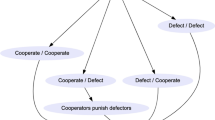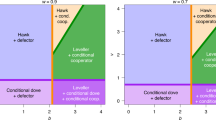Abstract
Coevolutionary optimisation suffers from a series of problems that interfere with the progressive escalating arms races that are hoped might solve difficult classes of optimisation problem. Here we explore the extent to which encouraging moderation in one coevolving population (termed parasites) can alleviate the problem of coevolutionary disengagement. Results suggest that, under these conditions, disengagement is avoided through maintaining variation in relative fitness scores. In order to explore whether standard diversity maintenance techniques such as resource sharing could achieve the same effects, we compare moderating virulence with resource sharing in a simple matching game. We demonstrate that moderating parasite virulence differs significantly from resource sharing, and that its tendency to prevent disengagement can also reduce the likelihood of coevolutionary optimisation halting at mediocre stable states.
Preview
Unable to display preview. Download preview PDF.
Similar content being viewed by others
References
Hillis, W.D.: Co-evolving parasites improve simulated evolution as an optimization procedure. Physica D 42, 228–234 (1990)
Pollack, J., Blair, A., Land, M.: Coevolution of a backgammon player. In: Langton, C.G., Shimohara, T. (eds.) Artificial Life V. MIT Press, Cambridge (1996)
Watson, R.A., Pollack, J.B.: Coevolutionary dynamics in a minimal substrate. In: Proc. Of the Genetic and Evolutionary Computation Conference, pp. 702–709. IEEE Press, Los Alamitos (2001)
Juillé, H., Pollack, J.: Coevolutionary learning: a case study. In: Shavlik, J.W. (ed.) Proc. Of the Fifteenth International Conference on Machine Learning. Morgan Kaufmann, San Francisco (1998)
Cliff, D., Miller, G.F.: Tracking the Red Queen: Measurements of adaptive progress in coevolutionary simulations. In: Morán, F., Moreno, A., Merelo, J.J., Chacón, P. (eds.) Third European Conference on Artificial Life, pp. 200–218. Springer, Heidelberg (1995)
Cartlidge, J., Bullock, S.: Learning lessons from the common cold: How reducing parasite virulence improves coevolutionary optimization. In: Fogel, D. (ed.) Congress on Evolutionary Computation, pp. 1420–1425. IEEE Press, Los Alamitos (2002)
Rosin, C.D., Belew, R.K.: New methods for competitive coevolution. Evolutionary Computation 5, 1–29 (1997)
Janzen, D.H.: When is it co-evolution? Evolution 34, 611–612 (1980)
Futuyma, D.J., Slatkin, M.: Coevolution. Sinauer Associates, Sunderland Mass (1983)
Fenner, F., Ratcliffe, F.N.: Myxomatosis. Cambridge University Press, Cambridge (1965)
Bullock, S., Cartlidge, J., Thompson, M.: Prospects for computational steering of evolutionary computation. In: Bilotta, E. (ed.) Artificial Life 8, Workshops, pp. 131–137. MIT Press, Cambridge (2002)
Author information
Authors and Affiliations
Editor information
Editors and Affiliations
Rights and permissions
Copyright information
© 2003 Springer-Verlag Berlin Heidelberg
About this paper
Cite this paper
Cartlidge, J., Bullock, S. (2003). Caring versus Sharing: How to Maintain Engagement and Diversity in Coevolving Populations. In: Banzhaf, W., Ziegler, J., Christaller, T., Dittrich, P., Kim, J.T. (eds) Advances in Artificial Life. ECAL 2003. Lecture Notes in Computer Science(), vol 2801. Springer, Berlin, Heidelberg. https://doi.org/10.1007/978-3-540-39432-7_32
Download citation
DOI: https://doi.org/10.1007/978-3-540-39432-7_32
Publisher Name: Springer, Berlin, Heidelberg
Print ISBN: 978-3-540-20057-4
Online ISBN: 978-3-540-39432-7
eBook Packages: Springer Book Archive




